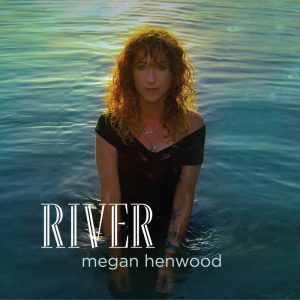 The third album by singer-songwriter Megan Henwood, River, is due for release on 27th October 2017. And it demonstrates the evolving talent and maturity of a singer who had already made considerable impression in 2009, when she and her brother Joe won Radio 2’s Young Folk Award, and a writer whose storytelling is supported by fine melodies and solid musicianship. This doesn’t strike me as a particularly folky album (which isn’t a criticism), however.
The third album by singer-songwriter Megan Henwood, River, is due for release on 27th October 2017. And it demonstrates the evolving talent and maturity of a singer who had already made considerable impression in 2009, when she and her brother Joe won Radio 2’s Young Folk Award, and a writer whose storytelling is supported by fine melodies and solid musicianship. This doesn’t strike me as a particularly folky album (which isn’t a criticism), however.
The songs are all written by Megan, who also plays acoustic and electric guitars here, while cellist Matthew Forbes and bassist Pete Thomas, long associated with her work, are once more strongly featured on this album. The early promotional copy I have doesn’t include details of these or other personnel, though the press release tells me that the CD was produced by Tom Excell, and the unexpected but very effective trumpet on ‘Fresh Water’ is by Jonny Enser. There’s no lyric sheet at this point, either, which always strikes me as being a shame when the words are as good as this. It also means that when I cite lyrics in this review, I may be inaccurate, so I apologise in advance for any accidental mondegreens, but her wordsmithing is too good not to try to quote.
Here’s a track-by-track listing:
- ‘Join The Dots’ uses a classic ballad structure, moving between a gentle verse to a dramatic chorus that reminded me a little too much melodically of Kate Bush’s ‘Running Up That Hill’ (sorry!).
- ‘Fresh Water’ lies a little closer to a fuzzy line between alt-folk and modern country with its acoustic fingerpicking. A very pretty love story –”I’ve got a thirsty heart and your love is like fresh water … to me” – with some perfectly judged double-tracking on the chorus.
- Megan’s song about Oxford, ‘The Dolly’, has the barest touch of Joni Mitchell-ish head register in the first verse, but also makes good use of her distinctive lower register. Great lyric, and the chorus has a nice bass line running in parallel to the vocal.
- The lyrics to ‘Seventh’ are a little more diffuse: the story is more difficult to follow, but the impact of the song is undeniable. Some nice touches of organ, too. As in one or two other places, the percussion seems a little too far forward here and there, though the suggestion of a ticking clock – I guess that’s a wood block – does suit the theme of the song. And perhaps it’s just an artefact of my elderly stereo.
- The wordless middle section to ‘Apples’ is a little overextended for my taste, but I like the combination of lyric and melody very much.
- ‘House On The Hill’ is a song about the scariness of romantic involvement – “I’m not afraid of the dark/but I’m afraid of you leaving“. The combination of the underlying electric guitar and strings is particularly atmospheric.
- The multi-tracking on parts of ‘Rainbows’ is a little denser, almost reminiscent in places of the Carpenters.
- ‘Peace Be The Alien’ includes some of my favourite lines: “From my follicles/down to my fingertips” and “Turn it down/headful of decibels“. Yes, “life’s too loud” but this song is definitely worth turning up the volume a bit.
- ‘Oh Brother’ explores the complexities of a sibling relationship. Autobiographical, perhaps, if it matters. A fine song, anyway.
- ‘Used To Be So Kind’ seems to pick up the theme of unkindness and being the firstborn child from the previous song. Some nice, slightly jazzy chord changes later in the song.
- ‘The Craftsman’ is probably my favourite Henwood song at the moment, and perhaps the folkiest. Just voice and acoustic guitar. Lovely.
- ‘L’Appel Du Vide’ is a French expression meaning “the call of the void”, similar to what Poe called ‘The Imp of the Perverse’: the sudden urge to do something harmful to oneself or to others. The song begins with an acapella section building into close harmonies, then develops the theme with some slightly eerie instrumental backing to match the disquieting lyric – “L’Appel du Vide I believe you’ve been haunting me/gather up all of my sins/siren won’t leave, she just sits here and sings to me/when will the finish begin?” Its understated drama makes for an unforgettable end to the album.
I tend to feel uneasy when I invoke the names of other artists in a review: all I’ll say on this occasion is that while Megan Henwood doesn’t sound too much like Mary Chapin Carpenter or Janis Ian – for a start, there’s something very English (in a very non-chauvinist way) about her use of language – but if you like the work of either of those artists (or maybe of Stevie Nicks), I’m pretty sure you’ll like Megan’s. It’s lyrically rich storytelling, melodically varied, imaginatively scored and sung with an unassuming, unforced range and fluidity. It’s certainly an album I’ll be listening to again, and I’ll be taking a look at her earlier recordings. Does that make me officially a fan?
David Harley
Artist’s website: www.meganhenwood.com
‘The Dolly’ live:
 Thanks for stopping by. Please help us continue and support us by tipping/donating to folking.com via
Thanks for stopping by. Please help us continue and support us by tipping/donating to folking.com via
You must be logged in to post a comment.